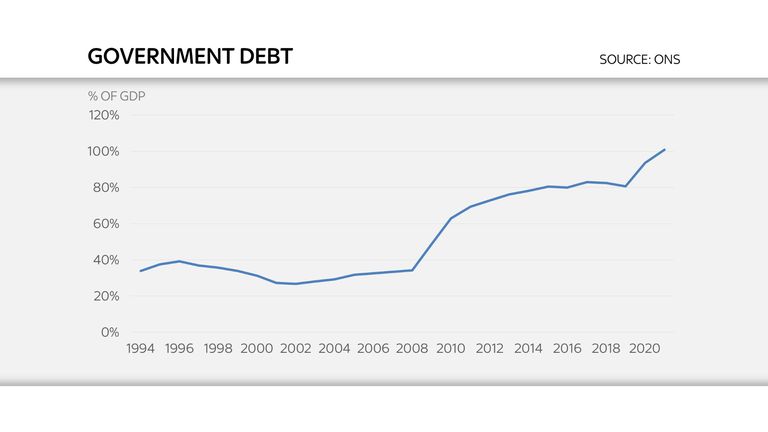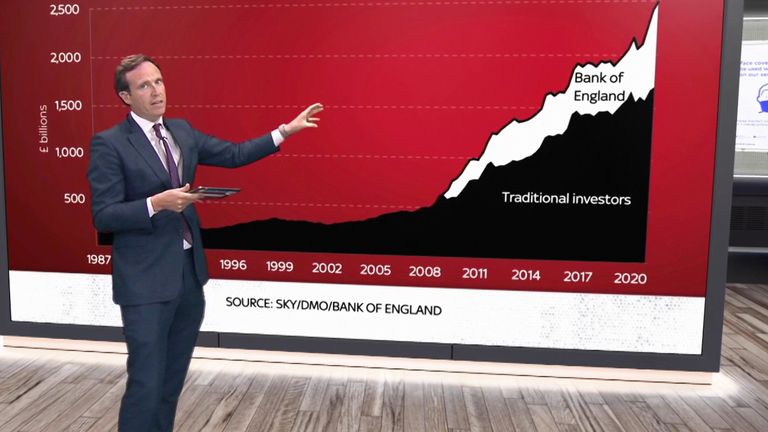Coronavirus: Borrowing soars to record £103.7bn as debt outstrips GDP
The figure lays bare the cost of the COVID-19 crisis, with the Treasury getting less tax while spending cash on rescue efforts.
Friday 19 June 2020 10:12, UK
Britain's borrowing has soared to a record £103.7bn as debt outstripped economic output for the first time in nearly six decades due to the coronavirus pandemic.
The figure for the first two months of the financial year is £87bn more than the same time last year - and the highest seen in any April-May period since current records began in 1993.
It further lays bare the cost to the nation's finances of the COVID-19 crisis, as the Treasury receives less tax income while pouring money into efforts to prop up struggling businesses and safeguard jobs, impacted by the coronavirus pandemic.
The Office for Budget Responsibility (OBR) had previously forecast that borrowing for the entire year was expected to hit £298.4bn.
According to the Office for National Statistics, borrowing in May is estimated to have been £55.2bn, roughly nine times or £49.6bn more than for the same month last year and is the highest in any month on record, after April's figure was revised down to £48.5bn from £62.1bn.
It means the UK's debt mountain stood at £1.95trn at the end of May 2020 - up by a fifth or £173.2bn from the same time last year and the largest year-on-year increase ever seen.
This is equivalent to 100.9% of gross domestic product (GDP), the first time it has been exceeded since March 1963.
Chancellor Rishi Sunak said: "Today's figures confirm that coronavirus is having a severe impact on our public finances.
"The best way to restore our public finances to a more sustainable footing is to safely reopen our economy so people can return to work.
"We've set out our plan to do this in a gradual and safe fashion, including reopening high streets across the country this week, as we kick-start our economic recovery."
:: Listen to the The World Tomorrow on Apple podcasts, Spotify, and Spreaker
The increase in borrowing came as central government receipts fell by 28.4% compared with May 2019 to £40.7bn, including £28.9bn in taxes.
Value Added Tax (VAT), Pay As You Earn (PAYE) Income Tax and Corporation Tax receipts fell by 46%, 29.4% and 14% respectively, the ONS said, although officials said this could change.
Speaking to Sky News, Paul Johnson, director of the Institute for Fiscal Studies, said: "We are going to be borrowing an enormous amount this year, probably in the order of £300bn.
"In real terms, as a fraction of the economy, it is by far the biggest we have borrowed at any time since the Second World War. It is much more than the borrowing was at the height of the financial crisis.
"This is a huge level of borrowing. The strange thing is if it were just for this year, if we were just paying to get through this year and then everything went back to normal, it wouldn't actually matter terribly much.
"We'd go into the next few years with more debt, it would take a while to pay it down but we could get back to normal.
"The real question is how much we are going to be borrowing next year and the year after and the year after as a result of the long term effects of this crisis."





